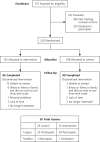Peer-Delivered Cognitive Behavioral Training to Improve Functioning in Patients With Diabetes: A Cluster-Randomized Trial
- PMID: 31937528
- PMCID: PMC7227468
- DOI: 10.1370/afm.2469
Peer-Delivered Cognitive Behavioral Training to Improve Functioning in Patients With Diabetes: A Cluster-Randomized Trial
Abstract
Purpose: Cognitive behavioral therapy (CBT)-based programs delivered by trained community members could improve functioning and pain in individuals who lack access to such programs. We tested the effectiveness of a peer-delivered diabetes self-management program integrating CBT principles in improving physical activity, functional status, pain, quality of life (QOL), and health outcomes in individuals with diabetes and chronic pain.
Methods: In this community-based, cluster-randomized controlled trial, intervention participants received a 3-month, peer-delivered, telephone-administered program. Attention control participants received a peer-delivered general health advice program. Outcomes were changes in functional status and pain (Western Ontario and McMaster Universities Osteoarthritis Index), QOL (Short Form 12), and physiologic measures (hemoglobin A1c, systolic blood pressure, body mass index); physical activity was the explanatory outcome.
Results: Of 195 participants with follow-up data, 80% were women, 96% African Americans, 74% had annual income <$20,000, and 64% had high school education or less. At follow-up, compared with controls, intervention participants had greater improvement in functional status (-10 ± 13 vs -5 ± 18, P = .002), pain (-10.5 ± 19 vs -4.8 ± 21, P = .01), and QOL (4.8 ± 8.8 vs 3.8 ± 8.8, P = .001). Physiologic measures did not change significantly in either group. At 3 months, a greater proportion of intervention than control participants reported no pain or did other forms of exercise when pain prevented them from walking for exercise.
Conclusion: This peer-delivered CBT-based intervention improved functioning, pain, QOL, and self-reported physical activity despite pain in individuals with diabetes and chronic pain. Trained community members can deliver effective CBT-based interventions in rural and under-resourced communities.
Trial registration: ClinicalTrials.gov NCT02538055.
Keywords: chronic pain; cognitive behavioral therapy; community health workers; community peer coaches; diabetes.
© 2020 Annals of Family Medicine, Inc.
Figures
Comment in
-
Task Sharing Chronic Disease Self-Management Training With Lay Health Coaches to Reduce Health Disparities.Ann Fam Med. 2020 Jan;18(1):2-3. doi: 10.1370/afm.2513. Ann Fam Med. 2020. PMID: 31937525 Free PMC article. No abstract available.
References
-
- Barker LE, Kirtland KA, Gregg EW, Geiss LS, Thompson TJ. Geographic distribution of diagnosed diabetes in the U.S.: a diabetes belt. Am J Prev Med. 2011; 40(4): 434–439. - PubMed
-
- Hale NL, Bennett KJ, Probst JC. Diabetes care and outcomes: disparities across rural America. J Community Health. 2010; 35(4): 365–374. - PubMed
-
- Druss BG, Marcus SC, Olfson M, Tanielian T, Elinson L, Pincus HA. Comparing the national economic burden of five chronic conditions. Health Aff (Millwood). 2001; 20(6): 233–241. - PubMed
Publication types
MeSH terms
Associated data
Grants and funding
LinkOut - more resources
Full Text Sources
Medical


